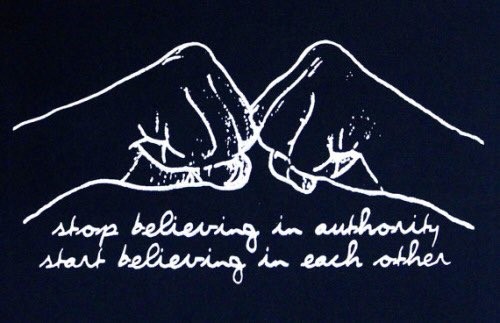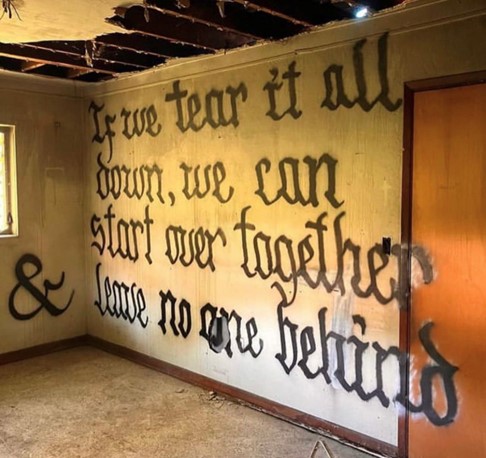Introducing concrete and lasting ideas for the cohorts to come
My name is Sascha, I am a 6th semester Politics, Philosophy & Economics student as of 2023, and you could call this my legacy to Karlshochschule. I’ve been a fervent advocate of anarchism throughout my years here, be it in lectures, at talks and onstage as a performer. With the opportunity to work at the library in Winter 2022 also came an opportunity to take this to the next and probably last step while I am here: Introducing concrete and lasting ideas for the cohorts to come.

The 2020s, I believe, will most likely be the most tumultuous period since the various student and peace movements in Europe and North America in the 60s and 70s. Various crises, be it the climate crisis, the crisis of economic order, organization and production, political legitimacy and the various hierarchies that are inherent to those crises, be it capitalism, white supremacy, patriarchy and the state, will either approach their conclusions in this decade or pivotal events that pave the way for decades to come will take place. Therefore, it is paramount to understand everyday people as political actors not only in their individual interactions or when they vote, but also in the potential to achieve collective, fundamental change from below. I believe anarchist praxis to be key to cultivating this understanding.
Anarchism, in its broadest terms, is not an ideology fixated on having a blueprint for a future society. Instead, it is focused on building a coherent political practice based on principles such as prefiguration and opposition to hierarchies and therefore, a diversity of organizational modes. Its distinctly diverse origins, with thinkers from around the world and communities and societies that already live anarchic practice with differing modes of organization as a result shows that anarchism is not only not Western, but also extremely adaptable to diverse lived contexts. As a result, anarchist or anarchist-adjacent thought can become very specific and diverse, which is the point.
My aim with this project then is not only to present my own views, but to also present as much of a variety of anarchist thought as possible. This meant a long, though not comprehensive, literature list, of which we could only order about half as physical copies as of February 2023. Concretely, the project includes foundational literature by the most prominent thinkers such as Emma Goldman, Mikhail Bakunin and Petr Kropotkin as well as modern literature in the realms of sociology, organization studies and analyses of the state that also present alternative visions for those of you in the business faculty.
Anarchism, or rather anarchist analysis, is seldom present in our universities and, therefore, in scientific discourse. David Graeber (2009) argues that, as anarchism is an ethics of practice, it is difficult to embody anarchist views in a university setting, where there is a hierarchical structure and a culture of intellectual competition. This form of organization would require an anarchist to oppose it. Doing so would likely result in serious consequences, so it is unclear what an “anarchist academic” could actually do. However, there are seeds of anarchist analysis present in academic discourse, which hopefully also make it to Karls’ library shelves soon. Examples would be the “Continuum Companion to Anarchism” published by Ruth Kinna, “Fragments of an Anarchist Anthropology” by David Graeber or “Contemporary Anarchist Studies” edited by Randall Amster et al.
Nevertheless, as Graeber recalls, academics tend to be unaware of anarchist thought and movements or even dismiss anarchism as a joke (e.g. “Anarchist organization! But isn’t that a contradiction in terms?”). More engaged critiques by, for example, Slavoj Žižek state that anarchic movements lack the stability to sustain themselves and a society beyond the “revolution” (Roos, 2013). Other, more commonly found counter arguments, revolve around human nature and its compatibility with anarchist views, and a, in my opinion, narrowly framed analysis of say, violence and justice in an anarchic world (Howell. 2014).
I hope that this attempt at bringing anarchist thought into the university has taken your attention to its rich and empowering as well as down to earth ideas and further inspires you personally, politically and academically towards more anarchic practice. I myself attempt to continue the legacy of David Graeber and other anarchic anthropologists, bringing anarchist thought into the anthropological realm while being active on the streets, in a union, or wherever my way may lead me. If you ever find yourself wanting to know more than what is offered here, discuss anarchism with me, are looking for ways to act, feel free to contact me: sascha-ilin@outlook.com

Special Thanks go to Robert Lepenies and Mandy Rosenberg for supporting me throughout the process of making this project happen.
Roos, Jerome (2013). The dangerous dreams of Slavoj Žižek.
Graeber, David (2009). Anarchism, academia, and the avant-garde. In: Amster, Randall et al. Contemporary Anarchist Studies: An Introductory Anthology of Anarchy in the Academy.
Howell, Christopher (2014). Anarchism: A critical analysis. Radical Criminology (4).